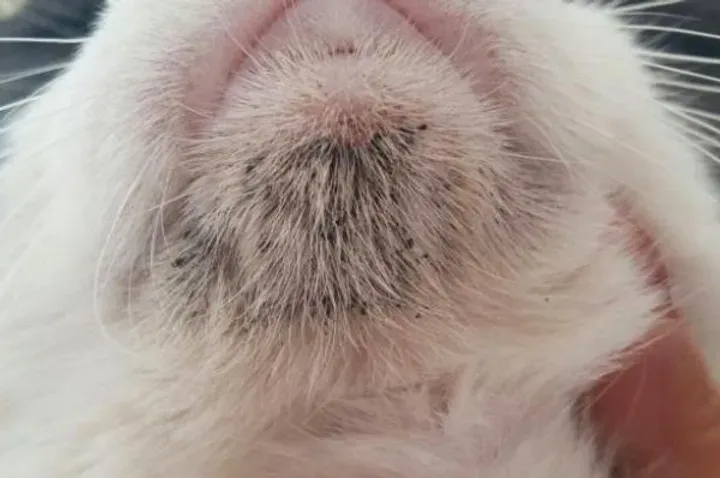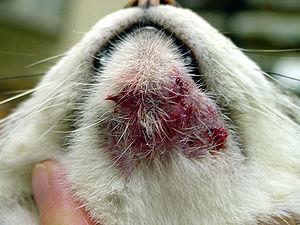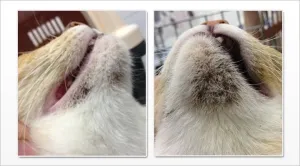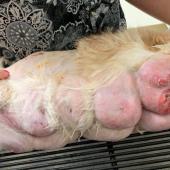Acne in cats Causes, Symptoms, and Treatment

Feline acne, although not widely discussed, is a common dermatological condition affecting cats. Similar to human acne, this condition can cause discomfort and concern for both the cat and its owner. Understanding the causes, symptoms, and appropriate treatments is crucial for managing feline acne effectively. If your cat has any skin changes you should make an appointment to see your vet - skin disease may sometimes be a sign of something else more serious.

What is feline acne?
Similar to human acne, feline acne is characterized by pustules and blackheads on the skin. Because sebaceous glands on the chin of cats create an oily fluid there, this area is where the disorder is most frequently observed. These glands are crucial for cats' territorial marking; you've probably seen your cat mark persons and things by rubbing its face and chin around them. Black spots on your cat's lips and chin are the initial indications that acne is starting. These result from gland blockage, and if the illness worsens, pus-filled areas may appear in the blocked gland as a result of infection. However, this is not always the case. Hair loss and scarring can occur in certain severe cases of acne.
How did my cat catch acne?
Certain cats are simply more prone to acne and secrete more greasy secretions than others. These cats may have a yellow discoloration of the fur under their chins, or you may see a black, oily accumulation of secretions where they rub. Additionally, a few underlying medical issues may impair your cat's immunity and increase their risk of developing acne.
Acne can sometimes be brought on by certain skin infections. It could be suggested that you avoid using plastic food bowls if your cat has acne. This might be the result of an allergic reaction to the plastic or the fact that these bowls are harder to clean than the glossy surfaces of metal or china plates.
How would I know if my cat has acne?
Your cat's chin probably has spots on it or is bloated, so they would probably be the first symptoms you see. The chin might occasionally seem unclean or as though it is covered in tiny black particles. Spots can occasionally extend to the eyes and face. Cats with acne can occasionally feel a little unpleasant, have a fever, and refuse to eat if their disease is very bad.
Symptoms of Feline Acne
Identifying feline acne is essential for prompt treatment. Common symptoms include:
- Blackheads: Small, black bumps on the chin or lips.
- Redness and inflammation: The affected area may appear red and swollen.
- Pustules: In severe cases, pus-filled bumps might develop.
- Itching and discomfort: Cats with acne may scratch their chin frequently or rub their face against objects to relieve discomfort.

What tests will my vet need to do?
Your vet will suspect that your cat has simple acne just by looking at the skin. However they may want to do some additional tests to see if they can find an underlying cause. Some cases can be triggered by stress or changes to routine so your vet may question you to identify a possible trigger factor. If there is still doubt about the cause of the lesions your vet can take a small piece of tissue from the skin (a biopsy) for analysis in a laboratory. This requires a general anaesthetic.
What else could cause these signs?
In order to rule out parasite illnesses that could mimic or coincide with acne, your veterinarian should rule out flea infections, ringworm, demodex (mange mites), and yeast infections. Persian cats are susceptible to a specific severe type of acne called "idiopathic facial dermatitis," which is very challenging to cure.
Causes of Feline Acne
Feline acne occurs when hair follicles become clogged with excess oil and skin debris. The exact cause is not always clear, but several factors may contribute to its development:
-
Poor grooming habits: Cats that do not groom themselves adequately might accumulate dirt and oil on their skin, leading to acne.
-
Plastic food and water bowls: Some cats develop a reaction to the chemicals in plastic bowls, leading to acne around the chin area.
-
Stress: Cats under stress might exhibit changes in their skin and coat, potentially triggering acne flare-ups.
-
Hormonal imbalances: Just like in humans, hormonal changes can affect the skin condition of cats, making them prone to acne.

What is the treatment for feline acne?
In minor situations, your veterinarian might offer you a wash to clean the infected regions of your skin, but no treatment is necessary. Although skin irritation is a common side effect, some cats may benefit more from not receiving therapy. Anyone who has ever had acne in their life understands how difficult it is to fully treat and how likely it is to reoccur. Hot compresses and antibacterial skin lotions or shampoos can be utilized in more serious situations. In certain situations, long-term supplementation like fish oil or evening primrose oil may be helpful. Antibiotic pills are rarely necessary.
Treatment options include:
-
Topical treatments: Your vet may recommend antiseptic wipes or medicated shampoos to clean the affected area.
-
Changing food and water bowls: Switching to stainless steel or ceramic bowls can eliminate the possibility of an allergic reaction to plastic.
-
Antibiotics: In severe cases, your vet might prescribe antibiotics to treat bacterial infections associated with acne.
-
Steroid injections: These can reduce inflammation and discomfort, especially if the acne is causing pain.
-
Regular cleaning: Gently clean the affected area with a mild antiseptic solution to prevent bacterial growth.
-
Preventive measures: Regular grooming, managing stress, and maintaining a clean living environment can prevent acne flare-ups.
Feline acne, though common, can be effectively managed with the right care and attention. By understanding the causes, recognizing the symptoms, and providing appropriate treatment, cat owners can ensure their feline companions live comfortable, acne-free lives. If you suspect your cat may have acne, consult a veterinarian promptly to start the necessary treatments and improve your cat's overall well-being.





